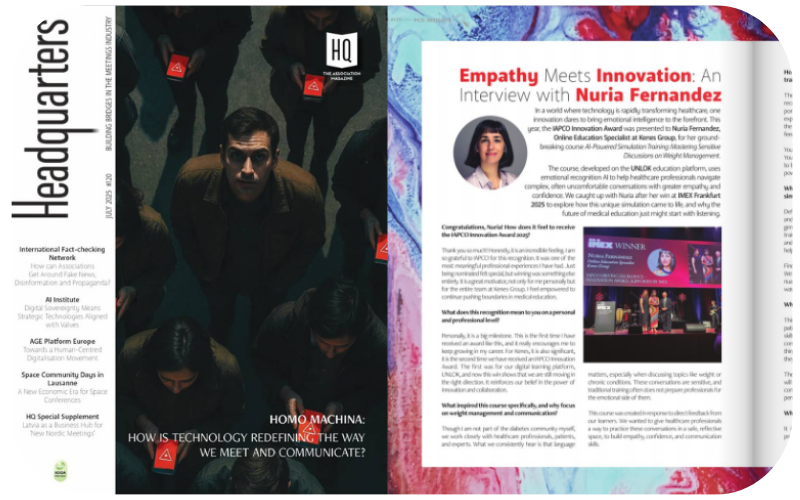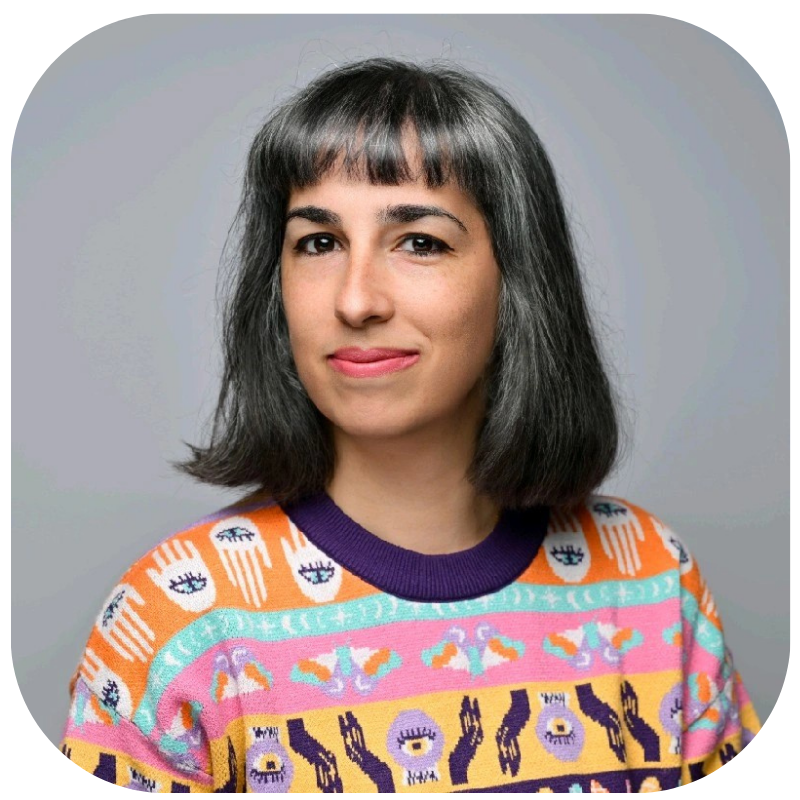
In a world where technology is rapidly transforming healthcare, one innovation dares to bring emotional intelligence to the forefront. This year, the IAPCO Innovation Award was presented to Nuria Fernandez, Online Education Specialist at Kenes Group, for her ground-breaking course AI-Powered Simulation Training: Mastering Sensitive Discussions on Weight Management.
The course, developed on the UNLOK education platform, uses emotional recognition AI to help healthcare professionals navigate complex, often uncomfortable conversations with greater empathy and confidence. We caught up with Nuria after her win at IMEX Frankfurt 2025 to explore how this unique simulation came to life, and why the future of medical education just might start with listening.
Q: Congratulations, Nuria! How does it feel to receive the IAPCO Innovation Award 2025?
Nuria: Thank you so much! Honestly, it is an incredible feeling. I am so grateful to IAPCO for this recognition. It was one of the most meaningful professional experiences I have had. Just being nominated felt special, but winning was something else entirely. It is a great motivator, not only for me personally but for the entire team at Kenes Group. I feel empowered to continue pushing boundaries in medical education.
Q: What does this recognition mean to you on a personal and professional level?
Nuria: Personally, it is a big milestone. This is the first time I have received an award like this, and it really encourages me to keep growing in my career. For Kenes, it is also significant, it is the second time we have received an IAPCO Innovation Award. The first was for our digital learning platform, UNLOK, and now this win shows that we are still moving in the right direction. It reinforces our belief in the power of innovation and collaboration.
Q: What inspired this course specifically, and why focus on weight management and communication?
Nuria: Though I am not part of the diabetes community myself, we work closely with healthcare professionals, patients, and experts. What we consistently hear is that language matters, especially when discussing topics like weight or chronic conditions. These conversations are sensitive, and traditional training often does not prepare professionals for the emotional side of them.
This course was created in response to direct feedback from our learners. We wanted to give healthcare professionals a way to practice these conversations in a safe, reflective space, to build empathy, confidence, and communication skills.
Q: How is this course different from other medical training?
Nuria: The main difference is the integration of emotional recognition AI. While the patient in the simulation is portrayed by a real actress, the AI monitors your facial expressions, tone of voice, and the words you use during the conversation. Based on that, it gives you personalised feedback creating a unique experience tailored to each user.
You are not just passively watching a video or reading slides. You are interacting. You are reflecting. You are learning how to become more emotionally aware and that is incredibly powerful, especially in healthcare.
Q: What were the biggest challenges in developing the simulation?
Nuria: Definitely integrating AI in a way that was meaningful and accurate. AI can sometimes ‘hallucinate’, meaning it generates incorrect or misleading responses. We had to train the system carefully, feeding it the right language and emotional cues so the feedback would be realistic and helpful.
Finding the right actress to portray the patient was also key. We needed someone who could really convey the emotional nuances of such a sensitive conversation. That authenticity was crucial to making the simulation feel real and impactful.
Q: Who can benefit from this training?
Nuria: This is not just for physicians; it is for anyone involved in patient care. Nurses, nutritionists, even support staff. The skills you develop through this activity are universal – eye contact, active listening, respectful language. These are things we sometimes forget in the rush of daily routines, but they make all the difference in how we connect with others.
The experience is also highly personalised, no two users will receive the same feedback. It is all based on how you communicate, which makes it both practical and deeply personal.
Q: What kind of feedback have you received so far?
Nuria: It is overwhelmingly positive. Over 300 healthcare professionals have already registered for the course, and the response has been fantastic. Many were surprised by how engaging it was, not just because of the technology, but because it made them think differently about empathy and communication.
Our key opinion leaders were also impressed. It is rare to see such innovation applied to soft skills training in medicine. And that is exactly where we see huge potential for growth.
Q: What is next for UNLOK and Kenes Group’s digital learning?
Nuria: We are continuing to grow the platform and expand our content. While this activity focused on interpersonal skills in diabetes care, our goal is to apply this model to other areas. For example, pregnancy and diabetes, older adults with comorbidities, or even patients with Alzheimer’s or cancer.
UNLOK is not just about technical knowledge. It is about building confidence and compassion. And that is what sets us apart. As I like to say, the sky is the limit.
Q: Any final thoughts for readers who might want to explore this experience themselves?
Nuria: Yes, I encourage anyone interested to visit the UNLOK platform and try the simulation themselves. It is not just about learning a skill, it is about seeing how technology can help us become more human. And that, to me, is the most exciting part of all.
 Nuria Fernandez’s work is a reminder that innovation does not always mean faster or flashier – it can also mean more human. By blending advanced AI with real emotional connection, her award-winning course shows that empathy can be learned, practiced, and refined like any other clinical skill.
Nuria Fernandez’s work is a reminder that innovation does not always mean faster or flashier – it can also mean more human. By blending advanced AI with real emotional connection, her award-winning course shows that empathy can be learned, practiced, and refined like any other clinical skill.
As the UNLOK platform continues to evolve, one thing remains clear: meaningful progress in healthcare depends not just on what we know, but on how we make others feel. And with leaders like Nuria at the helm, the future of medical education is in thoughtful, compassionate hands.
By Iva Popova, Marketing Communications Manager, Kenes Group
This article was originally published in the #120 issue of the Headquarters Magazine – Homo Machina: How is Technology Redefining the Way We Meet, page 48, 49 – March 2025: https://bit.ly/4lgTAKe